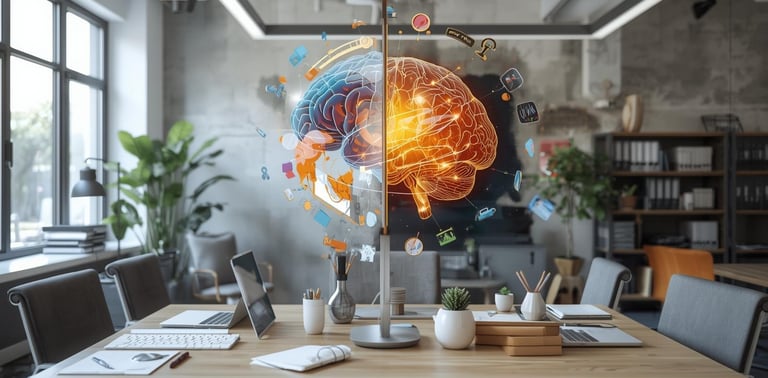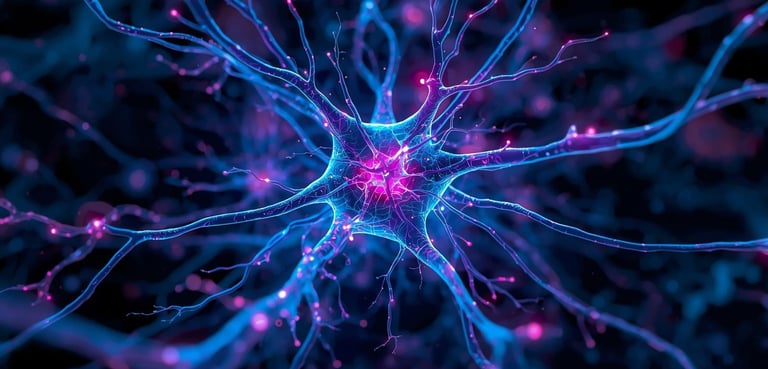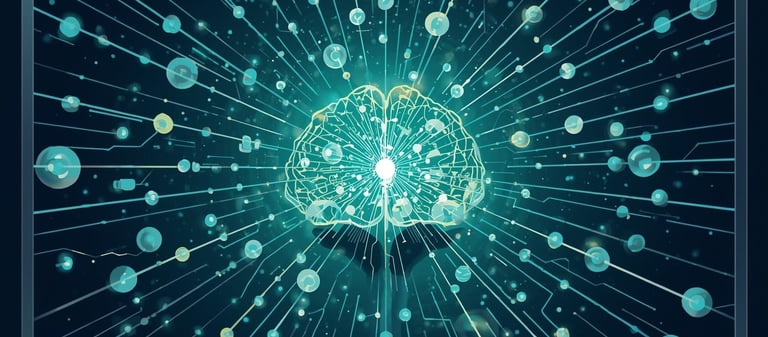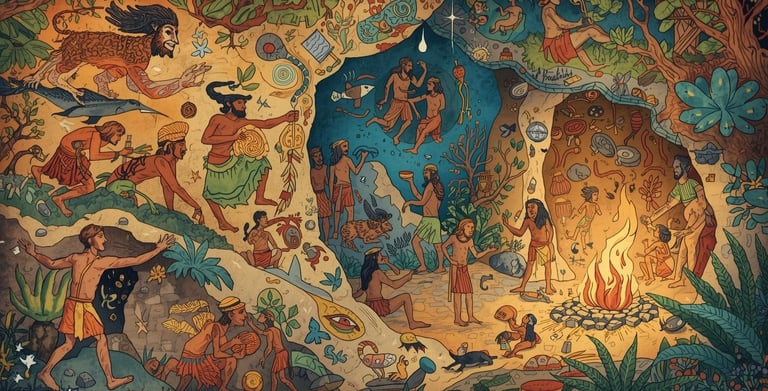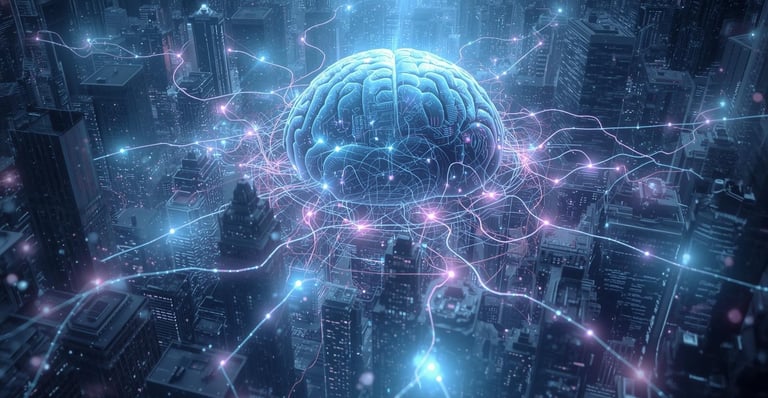The Evolution of Human Cognition: From Biological to Digital
"From Stone Tools to Digital Brains: The Journey of Human Cognition". Part 2
Gajanan L. Bhonde
9/2/20259 min read


Introduction to Human Cognition
Human cognition refers to the mental processes that encompass various functions including perception, attention, memory, reasoning, and decision-making. These cognitive faculties enable individuals to interpret information, understand complexity, solve problems, and navigate their environments. The intricacies of human cognition have been a subject of interest across numerous disciplines including psychology, neuroscience, and philosophy. Understanding these cognitive processes not only informs how we think and act but also sheds light on the very essence of what it means to be human.
The significance of human cognition in human history cannot be overstated. From the early stages of human development, cognitive abilities have played a crucial role in survival and adaptation. Early humans utilized their cognitive skills to develop language, create tools, and form social structures, which were essential for cooperation and communal life. As societies evolved, so too did cognitive practices, facilitating advancements in art, science, and technology. Each era has showcased how cognitive evolution allows for greater complexity in human interactions and innovations, driving humanity toward new frontiers of knowledge and understanding.
As we explore the evolution of human cognition further, it becomes apparent that cognitive capabilities have not only shaped individual experiences but also the collective trajectory of human history. By investigating the transition from biological cognition to the digital age, we can uncover the profound changes in how we process information and engage with the world. This evolution raises important questions about the impact of technology on our cognitive processes and encourages a reevaluation of what it means to think in an increasingly digital landscape.
Primitive Cognition: The Roots of Thought
The foundations of human cognition can be traced back to primitive instincts and basic memory functions that fostered survival in early human societies. Primitive cognition, characterized by instinctual behaviors, laid the groundwork for more complex cognitive processes that would later emerge. Early humans depended heavily on these cognitive abilities to navigate their environments, make critical decisions, and carry out essential tasks necessary for survival. For instance, the ability to recognize patterns of danger or opportunity in one’s surroundings was crucial. This instinctual recognition, coupled with rudimentary memory, allowed early humans to learn from their experiences, which is a fundamental aspect of cognition.
Instinctual behaviors such as the fight-or-flight response demonstrated how primal cognitive functions evolved in response to environmental stimuli. The brain's capacity to process sensory information quickly and designate appropriate responses was vital for survival against predators and in securing resources. Memory played a crucial role in this process, as individuals who could recall previous encounters with danger, advantageous locations, or social dynamics were better equipped to cope with the challenges of their environment.
Additionally, social interactions within small groups contributed to the development of early cognitive skills. Primitive humans learned to communicate basic needs and emotions, establishing the foundations for language. These communicative exchanges not only enhanced individual survival but also fostered communal cohesion. The sharing of knowledge and experiences flourished as a result of this early cognition, ultimately propelling the evolution of more intricate social and cognitive frameworks.
As we examine the evolution of human cognition, it becomes evident that these primitive forms were not mere survival tools. They were the essential building blocks from which complex thought, reasoning, and cultural practices would eventually develop. The instinctual behaviors and memory functions honed during our early existence represent the crucial roots of our cognitive capabilities, underpinning the advanced forms of thought that characterize modern human beings today.
Cultural Cognition: The Rise of Language and Storytelling
The emergence of cultural cognition marks a pivotal point in human evolution, primarily driven by the development of language and storytelling. Language serves not only as a means of communication but also as a vessel for transmitting knowledge, beliefs, and values across generations. Oral traditions, which were prevalent in early human societies, played a crucial role in enhancing cognitive processes by facilitating social interaction and collective memory. Through storytelling, individuals within a community shared experiences, formed shared identities, and reinforced cultural norms.
As societies evolved, the capacity for complex language allowed for more nuanced expressions of thought and emotion. This advancement enabled communities to articulate ideas and concepts that were previously difficult to convey. Stories became a way to make sense of the world, providing context and meaning to daily life. By weaving narratives, cultures preserved their histories, while simultaneously fostering a deeper understanding of human behavior and societal dynamics. This practice of storytelling also enhanced memory, as narratives often create a more engaging and memorable way of retaining information compared to mere factual recounting.
The cognitive benefits of language extend beyond mere communication; they foster collaboration and collective problem-solving. Shared narratives help to create a collective consciousness, allowing individuals to work together towards common goals and challenges. Furthermore, storytelling cultivates empathy, enabling listeners to immerse themselves in diverse perspectives. As language evolved, facilitating increasingly complex dialogues, cultural cognition became intertwined with social structures, leading to the proliferation of art, philosophy, and science.
In conclusion, the rise of language and storytelling significantly shaped the trajectory of human cognition. These cultural tools not only refined our ability to communicate but also enriched our understanding and memory, ultimately allowing civilizations to flourish and adapt across time. The legacy of cultural cognition continues to influence our cognitive landscapes, underscoring its importance in human development.
Scientific Cognition: Advancements in Knowledge Systems
The evolution of human cognition has been significantly shaped by various advancements in knowledge systems, marking a crucial transition to what is often termed scientific cognition. This period saw the enhancement of human cognitive capabilities through the introduction of tools, books, and organized frameworks that facilitated the recording and sharing of knowledge. The shift began with the written word, a monumental advancement that provided a means to document thoughts, theories, and discoveries. The invention of writing systems allowed for the preservation of knowledge across generations, creating a foundation for literacy and enabling individuals to access and contribute to accumulated human wisdom.
As literacy rates increased, so did the development of educational institutions, which became centers for the dissemination of knowledge. With the advent of the printing press in the 15th century, a significant transformation occurred in knowledge sharing. Printed books became widely available, allowing information to reach a broader audience and further democratizing access to learning. The spread of printed material played a pivotal role in the promotion of scientific inquiry, as scholars and amateurs alike began to share their findings and challenge existing paradigms.
Additionally, the formalization of knowledge into systems, such as encyclopedias and scientific journals, marked a turning point towards systematic thinking and empirical research. These organized collections of information catalyzed collaborative efforts in various fields, fostering an environment where systematic observation and logical reasoning could thrive. The scientific method emerged during this period as a standardized approach for conducting research, emphasizing observation, experimentation, and replicability, thus refining human cognition in the realm of knowledge acquisition. Overall, the transition to scientific cognition paved the way for advancements that continue to influence how we conceptualize and communicate understanding in modern times.
Digital Cognition: The Era of Artificial Intelligence
The landscape of digital cognition has undergone a profound transformation with the advent of artificial intelligence (AI) technologies. These innovations enable machines to perform complex cognitive tasks that were traditionally reserved for humans. Today, AI systems can analyze vast datasets with remarkable speed and accuracy, uncovering patterns and insights that would be impossible for an individual to discern. This capability illustrates a significant shift in how cognition is approached, merging biological understanding with digital processes.
The ability of AI to process information in a fraction of the time it takes a human not only enhances efficiency but also elevates the potential for more accurate decision-making across various fields, including healthcare, finance, and logistics. For instance, AI applications in medicine use machine learning algorithms to interpret medical images, often achieving diagnostic levels comparable to, and in some cases exceeding, those of seasoned radiologists. Such advancements suggest that while human cognitive abilities remain invaluable, machines are carving out a new domain of enhanced digital cognition.
Moreover, the algorithms that underpin AI systems continue to evolve, allowing for the refinement and expansion of cognitive tasks that machines can systematically perform. Techniques such as natural language processing (NLP) enable computers to understand and generate human language, leading to smarter conversational agents and more intuitive user experiences. As AI technology advances, the scope of digital cognition expands, prompting significant ethical and philosophical discussions about the implications of relying on machines for critical reasoning and decision-making processes.
Ultimately, as we navigate through the era of digital cognition, the interplay between human intelligence and artificial intelligence raises essential questions about collaboration, efficiency, and the future of cognitive tasks. Understanding these dynamics will be crucial as society continues to adapt to a world where machines enhance, rather than replace, human cognitive capacities.
Impact on Work, Education, and Communication
The evolution of human cognition, particularly through the integration of digital tools, has significantly reshaped the way individuals engage in work, education, and communication. As digital technologies become more embedded in daily life, they alter traditional practices, presenting both opportunities and challenges. In the workplace, methods of collaboration have transformed dramatically. The shift towards remote work and digital communication platforms, such as Slack, Microsoft Teams, and Zoom, enables employees to connect, share information, and collaborate in real time, regardless of their physical location. This transition fosters flexibility and can lead to greater work-life balance; however, it also raises concerns about information overload and the erosion of personal boundaries.
In the realm of education, the rise of online learning platforms has revolutionized traditional teaching methods. E-learning has made education more accessible, allowing students from diverse backgrounds to engage with high-quality resources from anywhere in the world. Digital tools such as interactive simulations, videos, and discussion forums foster active learning and enhance cognitive engagement, thereby enriching the educational experience. However, this shift also poses challenges, including the digital divide where access to technology varies significantly, creating disparities in educational opportunities. Furthermore, the necessity for self-directed learning can overwhelm some students, highlighting the need for support systems that assist them in navigating these new environments.
Communication, too, has undergone a transformation with the advent of digital platforms. Social media, instant messaging, and video conferencing have altered how individuals interact, allowing for instantaneous connection across geographies. These advancements facilitate the sharing of ideas and information in unprecedented ways. Nonetheless, the rise of digital communication has also led to concerns regarding misunderstanding due to the lack of non-verbal cues, potential misinterpretation, and the impact of echo chambers on public discourse. As we navigate this new landscape, it is essential to strike a balance between leveraging the benefits of digital tools while being aware of the challenges they present.
Looking Ahead: The Future of Human Cognition
As we look to the future, the evolution of human cognition is poised to undergo profound changes, largely driven by advancements in technology. The integration of artificial intelligence and machine learning systems into daily life is likely to influence cognitive processes significantly. These technologies not only assist humans with intricate tasks but also provide tools for enhancing memory, decision-making, and problem-solving capabilities. Consequently, individuals may find their cognitive functions augmented through interfaces that connect the brain with machines, challenging traditional notions of what it means to think and learn.
However, alongside these exciting prospects, ethical considerations must be at the forefront of discussions about the future of human cognition. As we increasingly rely on digital technologies to support cognitive tasks, the definition of intelligence may expand to include both human and machine contributions. This raises questions about agency, autonomy, and the potential consequences of relying too heavily on artificial systems. For example, will dependence on technology diminish our innate cognitive abilities, or will it foster new forms of intelligence that can coexist with human reasoning?
The balance between human and machine intelligence will be crucial in navigating the challenges ahead. As cognitive enhancements become more prevalent, society must grapple with the implications for equity and access. Not everyone may benefit equally from these advancements, which could lead to a divide between those with access to such technologies and those without. Ultimately, future innovations should aim to complement human cognition rather than replace it, cultivating a synergistic relationship between our biological capabilities and the digital tools we develop.
In conclusion, the future of human cognition promises both transformative possibilities and complex challenges. By embracing technological advancements while prioritizing ethical considerations, we can work towards fostering a cognitive landscape that enhances human potential without compromising our essential qualities.


